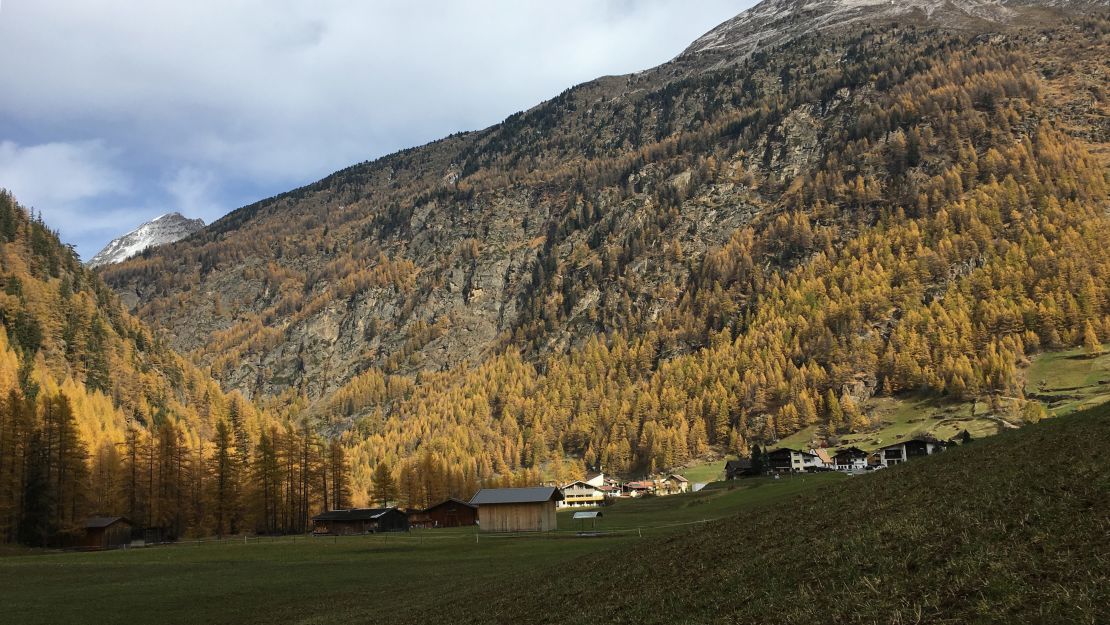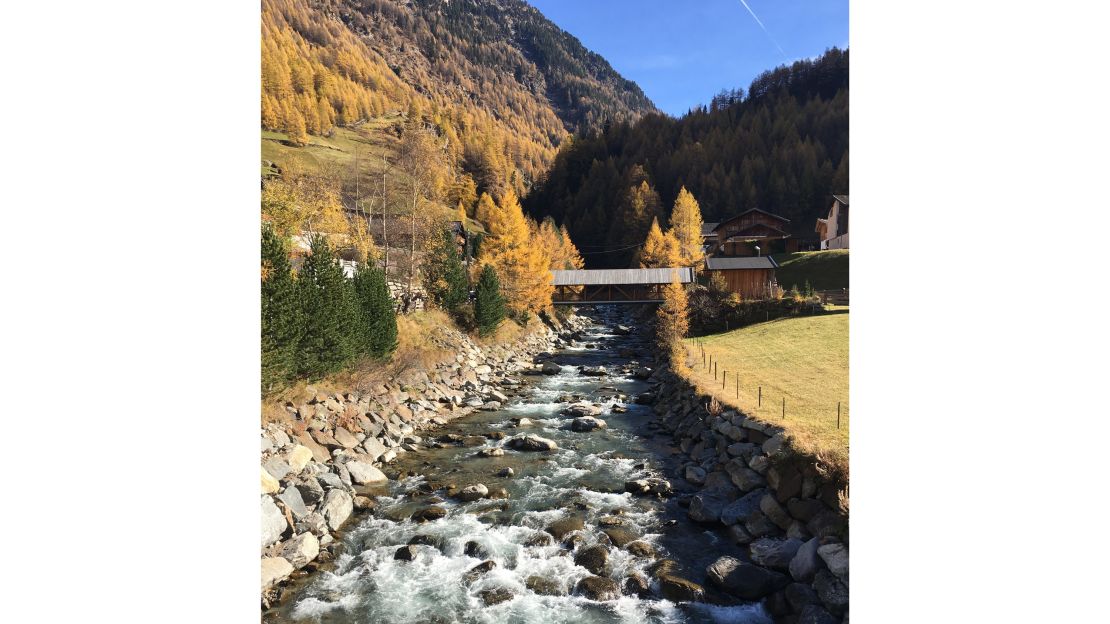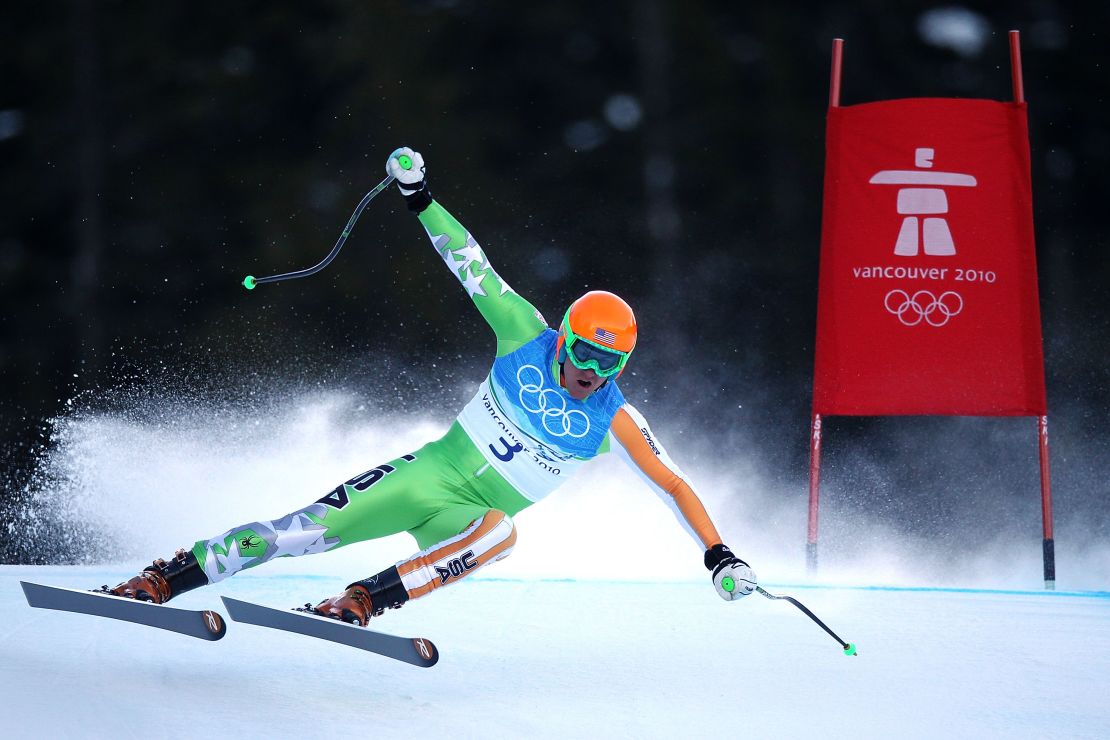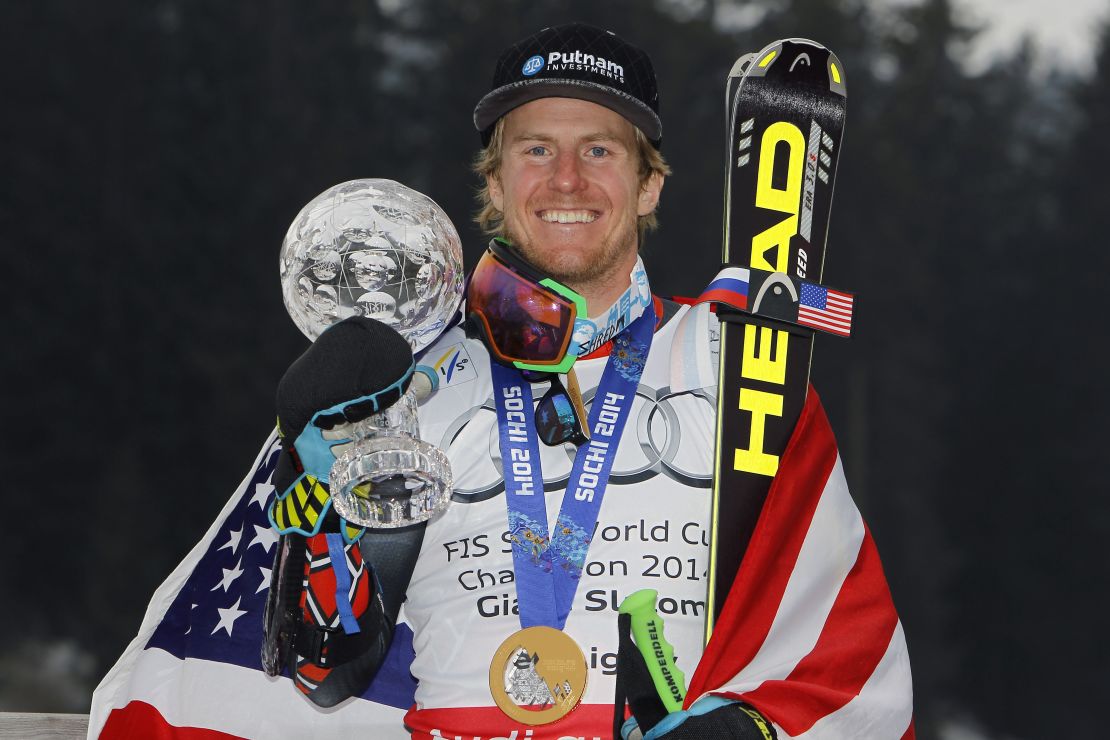Story highlights
Ligety became a father in the summer
American has was two Olympic gold medals
He is back competing after back surgery
In the communal dining area of a remote Austrian apartment block, the temporary European home of America’s best skiers, all eyes are on one person.
A grizzled coach is cooing, then a middle-aged woman starts to make incomprehensible sing-song noises. Hearts are melting.
This individual is extracting joyous toothy smiles from whoever enters the room.
He is the four-month-old son of two-time Olympic champion Ted Ligety, accompanying dad on the road while the man the rest of the world knows as “Ted the Shred” goes to work on the slopes.
“He’s just sitting there, smiling, doing his own thing,” says Ligety with a smitten look on his face. He didn’t know it was possible to love something so much until baby Jax was born.
Ligety, the 33-year-old great of the vertiginous slopes, still the youngest American male to win an Olympic Alpine skiing gold medal, has the contented demeanor of a new father at ease with a life that has forever changed.
He concedes he is a different person to the one who last competed nearly a year ago, before a back injury forced him under the surgeon’s knife. He is softer, more emotional, more focused.
He is skiing without pain for the first time in years, too.
READ: US ski great Bode Miller retires aged 40
“It’s a different mindset, for sure, a different release,” the five-time giant slalom world champion says of fatherhood.
“I feel I need to be on top of what I’m doing in training because I want to go home, so I’m definitely focusing more because of that.
“I’m not a very emotional person, but the most surprising thing for me is how having a kid softens you up, loving something so much, watching his little evolutions every day.
“The last couple of days he’s been making ‘oohing’ and ‘ahhing’ noises. Every single day there’s something new, which is really neat.”

The Utah native is speaking in the lobby of the apartments the US ski team has been using as its base during pre-season and the opening weeks of the FIS Ski World Cup season.
The sleepy Alpine village of Zwieselstein, the sort of place where a healthy tolerance of hairpin turns is required, will be home for Ligety, his wife Mia and Jax until the team moves 96km away, to a village near Innsbruck, when the season gets into full swing.
Outside, on a crisp technicolor afternoon in a part of the world known as “The Land in the Mountains,” all is quiet. Only nature makes a sound in a place such as this.
Autumn is changing the Alpine trees into varying shades of brown and dotted among the hazel, chocolate and caramel-colored pines are wooden houses, a tiny church and a restaurant to feed the horde of skiing enthusiasts who will descend to this basin of the Otzal valley over the winter.

READ: The ski resort with a James Bond museum
A river trickles through the village, continuing on its descent from the awe-inspiring mountains, and on a muddy track which leads to the US team’s modest-looking secluded block, a woman is pushing a pram. It is not an uncommon sight, not since the Americans set up camp here anyway.
“We’ve a bunch of newborns on the road,” says Ligety.
Sasha Rearick, the men’s head coach, Forest Carey, head technical coach, and skiers Steve Nyman and Andrew Weibrecht have also recently become parents.
“We’ve got little mascots,” Ligety chuckles. “Instead of having a team dog we’ve a team of babies!
“It’s fun. You can share the experience because others are going through the same things as well.”
But how do members of the team who aren’t parents feel about the new additions to the party? “You’ll have to ask them,” he says with a shrug.
“We’re on the men’s team and the boys aren’t really all that curious. There’s definitely not as much interest on the men’s side as there is when you hang around with the women – they want to hold them more.”

The American is today dressed in casual sportswear; a baseball cap, socks and a pair of slides sandals complete his easygoing look. He seems utterly relaxed on the eve of what was supposed to be his first World Cup competition of the season.
Less than 24 hours later, however, as the Apline fog rolled in, Ligety saw red when race organizers canceled the men’s giant slalom hours before the first run.
READ: Five reasons to be pumped for the ski season
Conditions were deemed “too dangerous” for the athletes and spectators.
Ligety voiced his disapproval on Twitter, hinting at a conspiracy. Baby Jax must wait a little longer, until November 26, for the super-G at Lake Louise, to watch Dad in action for the first time.

READ: Surgery marks end of Ligety’s medal run
The defending giant slalom Olympic champion, a winner of 25 World Cup races, has brought his family on the road because, he says, of the sadness he felt while training in New Zealand without them.
He would speak to his wife daily on FaceTime, and wave and play up to his son on screen, but hearing second-hand tales of his newborn’s latest gargles and babbles caused the heart to ache.
“I left and he was a little dough ball, not holding his head up, and I came back and he’s sitting up, looking at me, interacting,” he says.
“He’ll be one-and-a-half next year, running around, that’ll be a whole new challenge, for sure. But we’ll cross that bridge when we get there. I can’t imagine not having them on the road with me.”
Ligety is not the only father on the slopes. He can exchange tales of nappy changes and night-time feeds with fellow Alpine skiers Felix Neureuhter, Florian Eisath, Leif Kristian Haugen and Andre Myhrer, while there are also plenty of elite sportsmen combining fatherhood with continued sporting success.
There is Roger Federer, of course, the most famous sporting dad of them all, traveling the world with his wife and four children, still winning grand slams, still breaking records.
But Ligety laughs at the comparison with a man whose $64 million fortune allows for private planes, nannies and as many luxurious hotel rooms as his entourage requires.
“We have a fraction of the resources,” he says with a shake of the head. “It’s a different world.”
Regardless of income, every new family needs routine and, for Ligety, his current schedule comprises of gym work when his son is resting and nights in the spare bedroom before early-morning sessions and race days.
“It would be hard waking up at 5.30 in the morning to ski and getting up with him. He wakes up every two to three hours a night,” Ligety explains. “When I have a day off we all sleep together.”
Fatherhood is not the only thing contributing to Ligety’s cheerful demeanor.
He is back on the mountains, fit again, happy again, after being forced to bring last season to a premature end because of three herniated disks in his back.
Breaking bones and tearing ligaments is par for the course for those who ply their trade on the piste. With high speeds comes danger. According to the FIS, the sport’s governing body, one in three racers suffer severe injury during the season.
Ligety is therefore one of a number of skiers accustomed to the torture of rehab.
Early last year he had reconstructive knee surgery for a torn anterior cruciate ligament and to compound a miserable 12 months, after multiple cortisone injections and consultations with doctors and physiotherapists in search for a cure to the back problem which had been causing him discomfort for more than a year, Ligety finally raised the white flag and had surgery again in January.
It ended his defense of the giant slalom world title, an event in which he had reigned supreme since 2011.
READ: Why ‘life is dangerous’ for Alpine skiers
“In hindsight, I should’ve stopped earlier and got surgery earlier,” he concedes. “To know you have to pull the pin was definitely tough.
“Watching the World Championships was really tough, but at least I was on the road to recovery at that point, whereas in December and early January I was just struggling to figure out the best course of action.”
Listening to Ligety describe the severe pain he was experiencing while racing last year is enough to make anyone squirm.
“You know those wire cheese cutters?” he asks, bright eyed. “It felt like one of those was running from my back down to my foot.
“Whenever I hit a bump, something would yank on it. It felt like a sharp, wiry burning pain every time I hit a bump.
“If I was sitting in a good position it was OK, but standing up, I couldn’t do a straight leg raise.”
Ligety, whose broad shoulders make him look as wide as he is 5 feet 11 inches tall, stands up and bends his knee at about a 60-degree angle to illustrate the lack of movement he had in his left leg last season.
“I felt like I could race,” says Ligety, whose unique style means he is almost horizontal to the hill mid-turn in the giant slalom, his hips grazing the snow.
“I still had strength in it and I could still move, but every single time I hit a bump and my leg went straight, it was shooting pain.
“Every time I was hitting a bump, I was having to brace for that pain and it was not a productive way to going fast.”

Ligety last won a World Cup race on October 25, 2015. Fighting aches and pains, he reveals, “definitely weighs on you mentally.”
“It weighs on your skiing, too,” he continues. “When you’re going out training, you’re trying to avoid the pain and then you start to ski a bit differently to avoid those issues and, two months later, you’re wondering why you suck.
“Being healthy is so good because you can get correct motions. That fuels the skiing and fuels the confidence and all that sort of stuff.”
Such is Ligety’s love for skiing, he has been zig-zagging on snow since he was two years old, that he never considered retiring during his injury-plagued few years.
“It’s a good job so it’s easy to have that motivation to come back strong,” he says.
“When you haven’t been on the skis for three months and you know you have another three months until you can ski, it’s hard to grind through it, but it’s lucky for me that none of my injuries have been groundbreaking.
“There’s always been a clear pathway back, it’s just a matter of pushing through it.”
Fiery arrows of pain no longer tear down his leg – he was back training two months after the microdiscectomy procedure on his back – and after a summer of working on his technique, Ligety is now earnestly increasing his speed.
Visit CNN.com/sport for more news and videos
This is the man who, from 2008 to 2014, dominated the giant slalom. In a sport where the margin of victory is often hundredths of a second, he was winning races by nearly three seconds.
Can he return to that form before the Winter Olympics, which start in South Korea on February 9?
“I don’t know if I am where I want to be,” he says. “But I’m getting close.”






